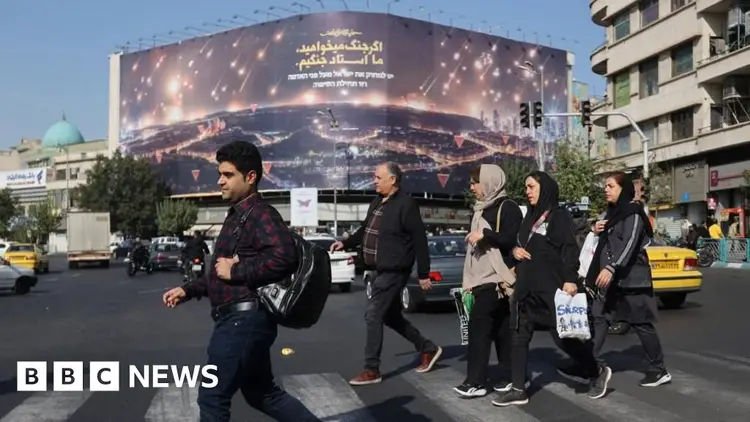What we know about Israel’s attack on Iran

Israel has carried out what it calls “accurate and focused” airstrikes on Iran in response to the wave of missile attacks from Tehran aimed at Israel earlier this month.
This is the newest development in a series of interactions between Israel and Iran that have raised concerns about the possibility of a full-scale regional conflict for several months.
Although Iran claims that the attacks on military locations resulted in the deaths of two soldiers, initial reports indicate that the extent of the assaults was not as extensive as previously anticipated.
Here’s what we understand.
How Did The Attacks Unfold?
Soon after 2:00 AM local time (11:30 PM BST), reports from Iranian media indicated that there were explosions occurring in and around the city of Tehran.
A video shared on social media and confirmed by the BBC displayed objects flying in the sky above the city, and some locals reported hearing loud explosions in various neighborhoods.
At approximately 2:30 AM, the Israeli military announced that it was conducting targeted attacks on "military sites" in Iran.
Israeli Prime Minister Benjamin Netanyahu and Defense Minister Yoav Gallant monitored the operation from the IDF command center located in Tel Aviv.
Shortly after 6:00 AM, the IDF announced that the airstrikes had finished.
The White House referred to the strikes as an act of self-defense. A high-ranking official from the administration stated that the United States collaborated with Israel to promote a response that was both "focused and proportional."
How Extensive Were The Attacks?
At this point, it is still uncertain how widespread the attacks are and the level of destruction they have caused.
The IDF reported that they struck various targets, such as missile production plants, surface-to-air missile sites, and additional military locations.
The Iranian military reported that two soldiers lost their lives "during a confrontation involving projectiles."
Iranian officials reported that locations in Tehran, Khuzestan, and Ilam provinces were struck. The nation’s air defense claimed it had effectively intercepted the assaults, although it acknowledged that “some regions experienced minor damage.”
A high-ranking official in the US government stated that the attacks did not target Iran's oil infrastructure or its nuclear sites, which President Joe Biden had advised Israel to avoid attacking.
Syrian state media announced that military locations in central and southern Syria were hit, but Israel has not acknowledged these attacks.
Why Did Israel Strike Iran?
Iran is the main supporter of various factions throughout the Middle East, commonly referred to as proxy groups, that are antagonistic towards Israel. This includes organizations like Hamas and Hezbollah, with whom Israel is currently engaged in conflict.
In April, Iran carried out its first direct assault on Israel, firing approximately 300 missiles and drones. This action was a response to an Israeli airstrike on an Iranian embassy site in Syria, which resulted in the deaths of several high-ranking officials from Iran's Revolutionary Guard Corps (IRGC).
Israel carried out a restrained attack on a missile defense system located in the Iranian area of Isfahan.
In July, Israel carried out an airstrike in Beirut that resulted in the death of a senior Hezbollah commander. The following day, an explosion in Tehran claimed the life of Hamas political leader Ismail Haniyeh. Iran accused Israel of being responsible for the incident, but Israel chose not to respond.
In late September, Israel carried out an assassination of Hezbollah's leader Hassan Nasrallah in Beirut, along with Brigadier General Abbas Nilforoushan, a senior Iranian official.
On October 1, Iran fired 200 ballistic missiles at Israel, claiming it was a reaction to the killings of Haniyeh and Nasrallah.
Initial indications suggest that this attack may not be as severe as many had anticipated.
According to the US news source Axios, before the attacks occurred, Israel communicated with Iran, sharing specific information about the impending assault and cautioning Tehran against taking any retaliatory action.
This might indicate that Israel is not looking to intensify the situation any further — at least for the time being.
In a statement, the IDF emphasized, "Our primary concern is achieving our military goals in the Gaza Strip and Lebanon. The real threat comes from Iran, which is actively encouraging broader conflict in the region."
A high-ranking official from the United States stated, "This should mark the conclusion of direct hostilities between Israel and Iran."
The reaction in Iran has, so far, been somewhat restrained.
According to a source cited by the Tasnim news agency, which is affiliated with Iran's Revolutionary Guard Corps (IRGC), "Iran maintains its right to react to any acts of aggression, and there is no question that Israel will face a response that matches any actions taken against it."
How Has The World Reacted?
UK Prime Minister Sir Keir Starmer acknowledged Israel's right to protect itself. However, he also urged everyone involved to exercise caution and appealed to Iran to refrain from taking action.
Sean Savett, spokesperson for the US National Security Council, stated that Israel's military actions were directed at military objectives and deliberately steered clear of populated regions. This stands in contrast to Iran's assault on Israel, which aimed at its largest city.
However, Washington's goal, he noted, is to speed up diplomatic efforts and reduce tensions in the Middle East.
Saudi Arabia denounced the attack and cautioned against any actions that could endanger the security and stability of the region.
Egypt's foreign ministry expressed similar worries, stating that it was "deeply troubled" by the attacks.
Hamas labeled these actions as a clear infringement on Iran's sovereignty, stating that they represent an increase in tension that threatens the security of the region and the well-being of its inhabitants.









































